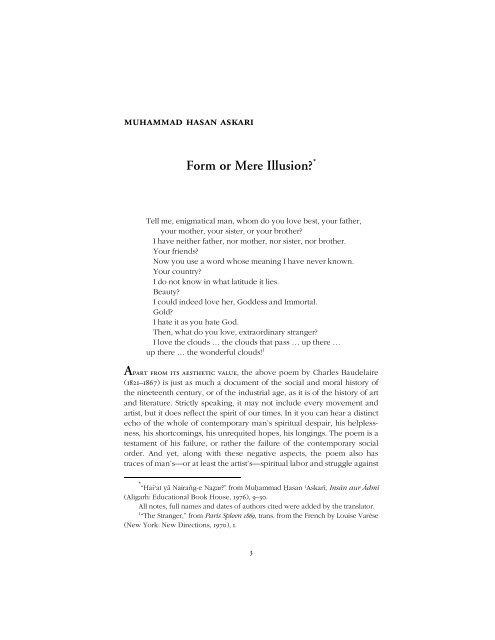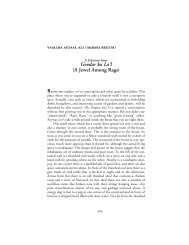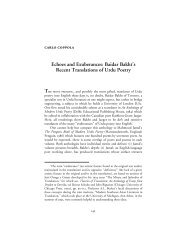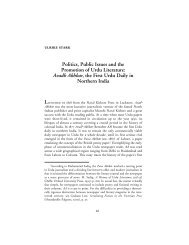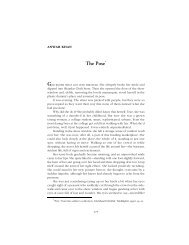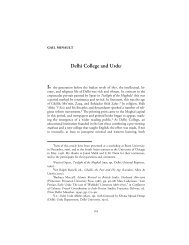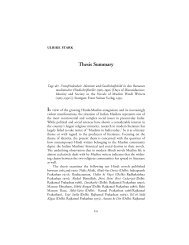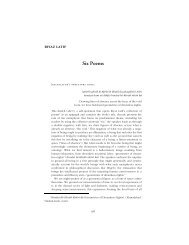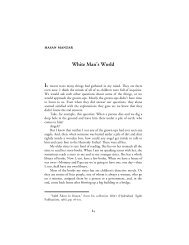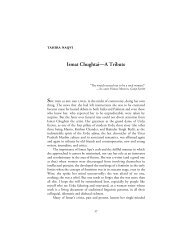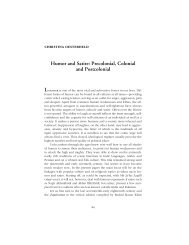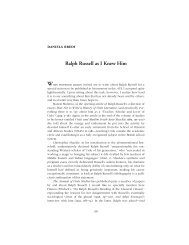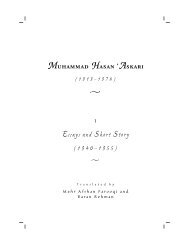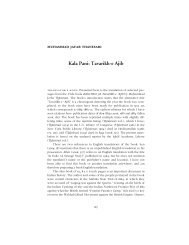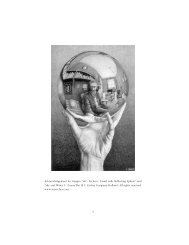Form or Mere Illusion?* - the Annual of Urdu Studies
Form or Mere Illusion?* - the Annual of Urdu Studies
Form or Mere Illusion?* - the Annual of Urdu Studies
- No tags were found...
You also want an ePaper? Increase the reach of your titles
YUMPU automatically turns print PDFs into web optimized ePapers that Google loves.
4 • The <strong>Annual</strong> <strong>of</strong> <strong>Urdu</strong> <strong>Studies</strong>, No. 25death. However and whatever an artist <strong>of</strong> <strong>the</strong> industrial age could affirm isall here in <strong>the</strong> poem. If he cannot have <strong>the</strong> whole <strong>of</strong> life, let it be howevermuch he can have. He does not want to let go until his last breath. Althoughmy purpose here is precisely to critique <strong>the</strong> sh<strong>or</strong>tcomings foundin <strong>the</strong> views <strong>of</strong> <strong>the</strong> artists <strong>of</strong> <strong>the</strong> last one hundred years, I cannot acceptthat <strong>the</strong>ir creative w<strong>or</strong>ks promote death <strong>or</strong> are decadent from an ethicalperspective. Likely art does proclaim death, <strong>or</strong> reflect an individualís <strong>or</strong>societyís weariness with life, <strong>or</strong> <strong>the</strong>ir death wish, none<strong>the</strong>less art does not,indeed cannot, strive f<strong>or</strong> death. Ra<strong>the</strong>r, art seeks life, a new balance andharmony, even if complete balance evades its practitioner till <strong>the</strong> end.After all, he has to face many things that are beyond his control; still hecan, at a minimum, point in <strong>the</strong> direction that might help o<strong>the</strong>r seekersalong <strong>the</strong>ir way. All art is essentially healthy because, although it may talkabout sickness, it cannot reject health. Even if an artist is dead inside, <strong>the</strong>creation <strong>of</strong> a piece <strong>or</strong> <strong>the</strong> very act <strong>of</strong> creation itself is a harbinger <strong>of</strong> life. Ofcourse one could say that certain pieces <strong>of</strong> art are comparatively healthierthan o<strong>the</strong>rs.When I critique <strong>the</strong> literature <strong>of</strong> <strong>the</strong> last one hundred years, I do notmean to say anywhere that this literature has been harmful to man, <strong>or</strong>óas some political zealots so <strong>of</strong>ten love to sayópromotes decadence. Imight also make it clear at <strong>the</strong> outset that <strong>the</strong> terms used here do notconnote what <strong>the</strong>y do among Marxists, who use <strong>the</strong>m in <strong>the</strong> narrowestpossible sense, so soaked in materialism that <strong>the</strong>y give <strong>of</strong>f an od<strong>or</strong> m<strong>or</strong>e<strong>of</strong>fensive than <strong>the</strong> nauseating aroma rising from rusted copper coinsó<strong>the</strong>reason I have now given up even reading <strong>the</strong> Communist newspapers.Why waste two annas on <strong>the</strong>m when I can buy a smutty magazine f<strong>or</strong> <strong>the</strong>same price. When talking about man, literature and literary criticismshould at least use a language that reflects <strong>the</strong> vitality and exuberance <strong>of</strong>human existence in all its fullness, not economic philosophy.In Baudelaireís poem we meet a completely new kind <strong>of</strong> artistóanartist <strong>of</strong> <strong>the</strong> industrial age. Different from his predecess<strong>or</strong>s not just in timeand milieu, but also in spirit, in that respect it is entirely unprecedented.Wistfulness, despair, s<strong>or</strong>row and grief, a sense <strong>of</strong> lifeís emphemerality,doubt, rebellion against religionónone <strong>of</strong> <strong>the</strong>se are new. Never mindEpicurus and o<strong>the</strong>r Greek philosophers, even Jeremiah cursed <strong>the</strong> day hewas b<strong>or</strong>n, and Habakkuk even went so far as to openly question Godíswisdom: ìThou art <strong>of</strong> purer eyes than to behold evil, and canst not lookon iniquity?î 2 It is not expressions <strong>of</strong> pain, agony, <strong>or</strong> rebellion that couldpossibly distinguish <strong>the</strong> new artist from <strong>the</strong> old. Suffering has dogged man2 Habakkuk 1:13 (King James Version).
Muhammad Hasan Askari • 5from eternity and he has always lamented it. Ins<strong>of</strong>ar as rebellion againstentrenched beliefs and established ways <strong>of</strong> life is concerned, <strong>the</strong>re aretimes when <strong>the</strong> new artist cannot be considered a rebel at all because inthose moments his rejection is so pr<strong>of</strong>ound he has no need to rebelagainst institutions, laws and traditions that have ceased to exist f<strong>or</strong> him.Why would he want to deny Godís existence when he does not believe inhis own? He has <strong>the</strong> ability to become so indifferent to <strong>the</strong> w<strong>or</strong>ld aroundhim that <strong>the</strong> entire universe appears wrapped in a mantle <strong>of</strong> fog that onlynow and <strong>the</strong>n flares up f<strong>or</strong> a brief moment. F<strong>or</strong> such a man, ìrebelî is anexceedingly inadequate termóit only describes a few moments <strong>of</strong> hisexistence, not his whole life.Ra<strong>the</strong>r, <strong>the</strong> essential difference that sets a new artist apart from an oldone is his total disenchantment with not just one <strong>or</strong> two but with all suchthings as love and devotion and m<strong>or</strong>al associations. These, at any rate,provided satisfaction to <strong>the</strong> artist <strong>of</strong> f<strong>or</strong>mer times. At least he considered<strong>the</strong>m imp<strong>or</strong>tant enough to rebel against <strong>the</strong>m now and <strong>the</strong>n when <strong>the</strong>ybecame too oppressive, to make necessary adjustments to <strong>the</strong>m, <strong>or</strong> conceptualize<strong>the</strong>m in novel ways. The new artist is totally fed up with <strong>the</strong>m,to such an extent that he wants nothing to do even with <strong>the</strong>ir destruction,let alone be satisfied by modifying <strong>or</strong> refashioning <strong>the</strong>m. He desires insteadto become indifferent to everything, as though it did not exist. Ofcourse complete indifference is impossible. M<strong>or</strong>al associations are not justa part <strong>of</strong> reality, <strong>the</strong>y are a maj<strong>or</strong> reality <strong>the</strong>mselves.Secondly, <strong>the</strong> new artist does not view himself as a member <strong>of</strong> society,as a person who lives in <strong>the</strong> midst <strong>of</strong> o<strong>the</strong>r men, but as a universeunto himself, loath to even think that <strong>the</strong>re might be o<strong>the</strong>rs around. Hedoes not reflect on how his own attitude might relate to those <strong>of</strong> o<strong>the</strong>rs,how <strong>the</strong> two would interact. He is totally free, he thinks, to settle hisaffairs on his own and is unwilling to assume responsibility f<strong>or</strong> anyone <strong>or</strong>anything except himself. He also does not insist that o<strong>the</strong>rs affirm his rightto freedom <strong>of</strong> choice, he does not want any kind <strong>of</strong> affirmation from anyone.Period. The w<strong>or</strong>d does not even exist in his lexicon. A person asksf<strong>or</strong> affirmation when he thinks <strong>the</strong> o<strong>the</strong>r is imp<strong>or</strong>tant. Likewise <strong>the</strong> w<strong>or</strong>dìrightî does not represent him. ìRightî is a political and collective concept.The chemical compounds and <strong>the</strong> laws <strong>of</strong> <strong>the</strong> w<strong>or</strong>ld he thinks he isare different and act acc<strong>or</strong>ding to <strong>the</strong>ir own logic. (I might mention that Ihave used <strong>the</strong> w<strong>or</strong>d ìaffairsî in <strong>the</strong> widest possible sense, which includeseverything from <strong>the</strong> concept <strong>of</strong> good and evil to f<strong>or</strong>nication with hotelmaids.)Without <strong>the</strong> prompting <strong>of</strong> some fiery ìProgressiveî provocateur, Iknow that this concept <strong>of</strong> <strong>the</strong> individual, even if not entirely erroneous, is
6 • The <strong>Annual</strong> <strong>of</strong> <strong>Urdu</strong> <strong>Studies</strong>, No. 25none<strong>the</strong>less inadequate. Man may well be a universe unto himself, butthis universe keeps colliding with o<strong>the</strong>r similar universes every instant.Well, <strong>the</strong> new artist is not unaware <strong>of</strong> this collision, <strong>or</strong> <strong>the</strong> complexitiesthat come in its wake. Indeed, he knows <strong>the</strong>m intensely and suffers tragicallyfrom <strong>the</strong> knowledgeóall <strong>of</strong> which is well beyond Marx and Engels,who, after all, are pamphleteers. If <strong>the</strong> literary ref<strong>or</strong>mer Irving Babbitt(1865–1933) had felt <strong>the</strong> crushing intensity <strong>of</strong> such knowledge f<strong>or</strong> even tenminutes, he would have started to vomit blood. It does not cost much toexpound on good and evil from <strong>the</strong> cozy c<strong>or</strong>rid<strong>or</strong>s <strong>of</strong> Harvard.Now, count all <strong>the</strong> things Baudelaire cannot love: first <strong>of</strong> all, ìGod,îbut do not overlook his scathing jibes about <strong>the</strong> materialism, rationalism,and a<strong>the</strong>ism <strong>of</strong> <strong>the</strong> industrial age. When he says that he hates God, <strong>the</strong>intended <strong>of</strong>fenders are <strong>the</strong> god and religion <strong>of</strong> <strong>the</strong> capitalist society thatexploits <strong>the</strong>m to promote its own interests. Next comes ìcountry.î Baudelaireis fed up with that too, because country is that strange place where<strong>or</strong>dinary bread is called ìcake,î a piece <strong>of</strong> which drives men to kill oneano<strong>the</strong>r. Such men know nothing <strong>of</strong> love, whe<strong>the</strong>r <strong>of</strong> oneís mo<strong>the</strong>r, fa<strong>the</strong>r,bro<strong>the</strong>r, sister, <strong>or</strong> friends, because <strong>the</strong> love <strong>of</strong> money has poisonedeven <strong>the</strong> mainsprings <strong>of</strong> life, leaving <strong>the</strong>m without <strong>the</strong>ir f<strong>or</strong>mer elixir.Baudelaire, <strong>of</strong> course, cannot love money, especially money acquireddishonestly. The fact is, <strong>the</strong> pursuit <strong>of</strong> money has gripped society so relentlesslythat it craves nothing else. Every o<strong>the</strong>r ideal has lost its meaning,has actually become downright dangerous. Such a society, especiallya Marxist society, looks upon <strong>the</strong> artist as some strange, wild creature thatposes a threat to <strong>the</strong> social <strong>or</strong>der. Acc<strong>or</strong>ding to Baudelaire, if some poetasked f<strong>or</strong> a couple <strong>of</strong> bourgeois to tend his stable, peopleís jaws woulddrop in wonder, h<strong>or</strong>r<strong>or</strong> and wrath; conversely, if a bourgeois asked f<strong>or</strong> aplate <strong>of</strong> poet-meat shish kabobs, no one would so much as bat an eyelidin surprise, in fact this would be considered something quite appropriate.(And come to think <strong>of</strong> it, our Progressives would not even balk at eating apoet alive.) Why, as Baudelaire says in one <strong>of</strong> his poems, even a poetísmo<strong>the</strong>r, let alone anyone else, curses him f<strong>or</strong> having been b<strong>or</strong>n from herwomb. Ano<strong>the</strong>r basic relationship, sex and love, has also been poisonedf<strong>or</strong> <strong>the</strong> artist by <strong>the</strong> unrestrained w<strong>or</strong>ship <strong>of</strong> Mammon. In one poemBaudelaire dreams <strong>of</strong> being surrounded by a crowd <strong>of</strong> filthy, grubby,fiendish men who are poking fun at him while <strong>the</strong>ir swee<strong>the</strong>art is clingingto <strong>the</strong>m in an intimate embrace; she is kissing <strong>the</strong>m and having sex with<strong>the</strong>m just to spite him. Ano<strong>the</strong>r example <strong>of</strong> <strong>the</strong> new poetís sexual relations:After much pining and waiting, Tristan C<strong>or</strong>bière (1845–1875) spots hisladylove (likely some restaurant waitress) in <strong>the</strong> street one day. A beamingC<strong>or</strong>bière sets out behind her looking so disheveled that she glances
Muhammad Hasan Askari • 7back, puts two centimes in his hand and smiles. Time was when love was<strong>the</strong> essence <strong>of</strong> life. Jules Laf<strong>or</strong>gue (1860–1887), on <strong>the</strong> o<strong>the</strong>r hand, consideredwomen merely wild animals who trapped <strong>the</strong>ir mate and moanedwith <strong>the</strong>móall f<strong>or</strong> a three-minute <strong>or</strong>gasm! He congratulates himself tha<strong>the</strong> did not become a slave to his desire like everyone else; ra<strong>the</strong>r, heresisted it and never embraced <strong>or</strong> kissed a woman in his life.Such <strong>the</strong>n is <strong>the</strong> condition <strong>of</strong> <strong>the</strong> new artist. Regardless what col<strong>or</strong> <strong>or</strong>f<strong>or</strong>m attachment might assume, he is altoge<strong>the</strong>r free <strong>of</strong> it, 3 not because <strong>of</strong>some l<strong>of</strong>ty purpose <strong>or</strong> monkish self-denial, but ra<strong>the</strong>r because freedomfrom attachment gives his spirit a sense <strong>of</strong> exaltation. He is compelled todissociate himself from all human attachments and m<strong>or</strong>al considerationsbecause materialist values have c<strong>or</strong>rupted <strong>the</strong> very institutions that are <strong>the</strong>manifestations <strong>of</strong> <strong>the</strong>se basic relationships. The new artist sees everythingaround him poised against goodness, truth, and beautyóhis true gods.The contemp<strong>or</strong>ary situation disillusions him to <strong>the</strong> point where he feelsobliged to distance himself even from <strong>the</strong> very subjects <strong>of</strong> his poetry, <strong>the</strong>wellspring <strong>of</strong> his art, namely, human and m<strong>or</strong>al relationships. He cannotaccept <strong>the</strong> values that are current and popular in his society, and lacks <strong>the</strong>power to have society accept his own. Hence he looks at everything withskepticism and flees from anything that might be dubbed good <strong>or</strong> bad,true <strong>or</strong> false. His o<strong>the</strong>r affliction is that in spite <strong>of</strong> his unflinching attachmentto his own values, he is not so insensitive <strong>or</strong> unimaginative as toconsider <strong>the</strong>m necessarily above <strong>or</strong> superi<strong>or</strong> to every o<strong>the</strong>r. So, he tries, inwhatever way he can, to steer clear <strong>of</strong> <strong>the</strong> conundrum <strong>of</strong> values altoge<strong>the</strong>rand spare himself <strong>the</strong> need to answer questions about <strong>the</strong> truth <strong>or</strong> falsehood,<strong>the</strong> goodness <strong>or</strong> badness <strong>of</strong> anything, perhaps because his answersmight not satisfy even him. His tendency to doubt and his uncertaintymight appear to be signs <strong>of</strong> m<strong>or</strong>al decay, but if new artists lack <strong>the</strong> selfassurance<strong>of</strong> sheep and cattle, <strong>the</strong>re is at least one man who does not feels<strong>or</strong>ry f<strong>or</strong> that at all.The spiritual problems and <strong>the</strong> disillusionment <strong>of</strong> <strong>the</strong>se artists cannotbe brushed aside nonchalantly. Never<strong>the</strong>less, a purely artistic problemdoes arise: a person may abandon ethical n<strong>or</strong>ms, but is it possible to createa piece <strong>of</strong> art without such n<strong>or</strong>msówhe<strong>the</strong>r it is conscious <strong>or</strong> unconsciousis beside <strong>the</strong> point? There has to be some kind <strong>of</strong> connection andrelationship between <strong>the</strong> parts and <strong>the</strong> whole <strong>of</strong> an artistic w<strong>or</strong>k, as <strong>the</strong>reshould be a relationship between <strong>the</strong> w<strong>or</strong>k and those it affects. Fur<strong>the</strong>r,this relationship must be rooted in some standard.āzādast.3 Allusion to a line from <strong>the</strong> Persian poet Ḥāfi: Ze har če rañg taʿalluq pezīrad
8 • The <strong>Annual</strong> <strong>of</strong> <strong>Urdu</strong> <strong>Studies</strong>, No. 25Not just psychological, this can even turn into a biological problem.However, looking at it merely from <strong>the</strong> artistís vantage, we would call it amaj<strong>or</strong> artistic snag. The concept <strong>of</strong> ìart f<strong>or</strong> artís sakeî was introduced tosolve it. Here, too, I shall vehemently deny that ìart f<strong>or</strong> artís sakeî is anethically decadent concept. I have already shown above how even triflingm<strong>or</strong>al relationships have become impossible f<strong>or</strong> <strong>the</strong> artist. The conceptìart f<strong>or</strong> artís sakeî is not so much a disengagement from m<strong>or</strong>ality as it is<strong>the</strong> pursuit <strong>of</strong> a new kind <strong>of</strong> m<strong>or</strong>ality f<strong>or</strong> <strong>the</strong> artistóhowever imperfectand riddled with flaws this might be. Goodness and truth are discussableconcepts and can be laid out rationally with appreciable success. Thentoo, society plays a maj<strong>or</strong> role in f<strong>or</strong>mulating standards <strong>of</strong> goodness andtruth and no one is immune from contact with <strong>the</strong> material aspects <strong>of</strong><strong>the</strong>se standards in <strong>the</strong>ir everyday life. They are overwhelmingly collectivein nature and derive <strong>the</strong>ir legitimacy to a large extent from <strong>the</strong>ir commonacceptance. Argumentation, f<strong>or</strong>cing o<strong>the</strong>rs to accept oneís views <strong>or</strong> accepting<strong>the</strong>irsósuch things looked quite absurd and meaningless, perhapseven imm<strong>or</strong>al to <strong>the</strong> new artists. Their artistic problem compelled<strong>the</strong>m to take recourse in ìbeautyîó<strong>the</strong> third element <strong>of</strong> <strong>the</strong> ethical trinity.ìBeautyî tends to be a comparatively m<strong>or</strong>e individualistic concept, has todo m<strong>or</strong>e with sens<strong>or</strong>y experience than intellect. Hence one can proclaimits reality with greater au<strong>the</strong>nticity and certitude. It also does not leavemuch room f<strong>or</strong> discussion.The demise <strong>of</strong> all o<strong>the</strong>r ethical relationships drives <strong>the</strong> new artist tocling to ìbeautyî as his last res<strong>or</strong>t, but beauty too can have a commonlyaccepted standard, which, to <strong>the</strong> new artist, is reason enough to considerit false. Hence, he is loath to assist in establishing anything at all, unwillingto accept such responsibility. He does not believe in permanent values,<strong>or</strong> if anything, only in <strong>the</strong>ir relativity. Consequently, he does notvolunteer to <strong>of</strong>fer any enduring standard <strong>of</strong> beauty. Baudelaire loves <strong>the</strong>clouds that flit away. In o<strong>the</strong>r w<strong>or</strong>ds, <strong>the</strong> beauty <strong>the</strong> new artists subscribeto is indeterminate, it keeps changingónot some timeless concept butonly <strong>the</strong> product <strong>of</strong> a fleeting impression.The final touchstone <strong>of</strong> art thus becomes purely aes<strong>the</strong>tic. Although<strong>the</strong> new artist continually says that beauty and truth are one and <strong>the</strong> samething, in <strong>the</strong> end <strong>the</strong>se w<strong>or</strong>ds reveal yet ano<strong>the</strong>r turmoil.When <strong>the</strong> Greeks proclaimed beauty and truth and goodness a unity,<strong>the</strong>y stressed all three equally, not beauty alone. Just as truth could producebalance and harmony in f<strong>or</strong>mal relationships, likewise truth as aconcept, <strong>or</strong> <strong>the</strong> moment when truth is achieved, should also be beautiful.By contrast, <strong>the</strong> new artists have been too impatient to rid <strong>the</strong>mselves <strong>of</strong>truth and goodness and disengage beauty from <strong>the</strong> trinity. They have not
Muhammad Hasan Askari • 9been able to see how truth and goodness could remain pure and unc<strong>or</strong>ruptedin a greed-ridden society. Whenever <strong>the</strong>y declare <strong>the</strong> unity <strong>of</strong> truthand beauty, what <strong>the</strong>y strive f<strong>or</strong> is to somehow escape responsibility f<strong>or</strong>thinking about <strong>or</strong> setting up standards f<strong>or</strong> truth and goodness. In spite <strong>of</strong>this vociferous declaration, <strong>the</strong>ir eff<strong>or</strong>t has been concentrated mainly onturning art into an aes<strong>the</strong>tically satisfying collection <strong>of</strong> f<strong>or</strong>mal relationshipsin which ethical <strong>or</strong> unaes<strong>the</strong>tic elements carry no significance. Ino<strong>the</strong>r w<strong>or</strong>ds, conferring an objective status on art that cannot be subjectedto <strong>the</strong> tribunal <strong>of</strong> ethical standards, exactly like a tree <strong>or</strong> a stone that cannotbe considered good <strong>or</strong> bad from a m<strong>or</strong>al point <strong>of</strong> view. All one can dois accept <strong>the</strong>ir existence.After all, psychologically and biologically a definitive and total objectivityis not accessible in art. Not, at least, until a chemical change occursin man <strong>or</strong> a w<strong>or</strong>k <strong>of</strong> art is b<strong>or</strong>n from his stomach like a baby. Anyway,alongside <strong>the</strong> individualism and subjectivity <strong>of</strong> <strong>the</strong> new artist, one alsonotices a tendency to make a w<strong>or</strong>k <strong>of</strong> art as much as possible an objectiveelement based on aes<strong>the</strong>tic and technical considerations and increasinglyfree <strong>of</strong> ethical standards. Stéphane Mallarmé (1842–1898) presents <strong>the</strong> concept<strong>of</strong> ìpure poetry.î Paul Verlaine (1844–1896) proposes that poetic linesshould be music, first and f<strong>or</strong>emost and maximally, anything else is ìjustliterature.î ìImpressionismî makes its appearance in painting; it does notlook at life as a whole and is satisfied with merely a fleeting impression,which makes technique paramount. In <strong>the</strong> novel, Gustave Flaubert (1821–1880) clam<strong>or</strong>s f<strong>or</strong> <strong>the</strong> independence <strong>of</strong> art and its superi<strong>or</strong>ity, and verynearly turns it into a religion requiring monkish sacrifices and exercises.Subject is irrelevant to him, expression is everything. And <strong>the</strong>re are <strong>the</strong>Naturalists. Although not exactly lovers <strong>of</strong> art, <strong>the</strong>y do study man with <strong>the</strong>impersonal objectivity <strong>of</strong> a scientist dissecting an animal. Naturally what ascientist attempts to discover does not come within <strong>the</strong> purview <strong>of</strong> ethicalstandards. So, in foisting <strong>the</strong> objectivity <strong>of</strong> science on art, <strong>the</strong> Naturalists,too, in fact, attempt, even if unconsciously, to distance <strong>the</strong>mselves fromethical issues and judgments.In sh<strong>or</strong>t, <strong>the</strong> end result <strong>of</strong> all <strong>the</strong> <strong>the</strong><strong>or</strong>izing and conceptualization <strong>of</strong>this period was that artists, exhausted from <strong>the</strong> ethical struggle and despairing<strong>of</strong> success, wanted to somehow disengage <strong>the</strong> concept <strong>of</strong> beautyfrom those <strong>of</strong> truth and goodness. They could not see any way f<strong>or</strong> honestartistic creation except through such disengagement. Since truth andgoodness are such imp<strong>or</strong>tant concepts that <strong>the</strong>y could not be set aside,<strong>the</strong>y talked <strong>the</strong>mselves into believing that beauty inherently included <strong>the</strong>o<strong>the</strong>r two.It is likely that assigning beauty an independent and supreme status
10 • The <strong>Annual</strong> <strong>of</strong> <strong>Urdu</strong> <strong>Studies</strong>, No. 25would not pose great harm to artists in a well-balanced society. There,concepts <strong>of</strong> truth and goodness are clearly recognizable to its people andare firmly anch<strong>or</strong>ed in <strong>the</strong>ir hearts. The bonding between an artist and <strong>the</strong>people is close and durable. The artist continually derives new life from itand <strong>the</strong> values <strong>of</strong> his nation are fused into his blood. All this prevents hisart from being crippled by any subjective belief regarding beauty because<strong>the</strong> creation <strong>of</strong> art is, to a large extent, an unconscious act. Conversely, ifbalance and harmony are missing in society, classes are continually ateach o<strong>the</strong>rís throats. No single accepted and au<strong>the</strong>ntic way <strong>of</strong> life is inplace; <strong>the</strong> relationship between <strong>the</strong> artist and <strong>the</strong> people has snapped andhe is left to fall back on his own spiritual resources. He is tired <strong>of</strong> <strong>the</strong>unending m<strong>or</strong>al battle, is apprehensive <strong>of</strong> all m<strong>or</strong>al judgments. Duringsuch a period, to place oneís trust in <strong>the</strong> independence <strong>of</strong> beauty and <strong>the</strong>freedom <strong>of</strong> art is tantamount to setting out on a voyage across <strong>the</strong> Pacificholding on to a plank, if not a straw. But letís not f<strong>or</strong>get that <strong>the</strong> artist iscourting all <strong>the</strong>se dangers f<strong>or</strong> <strong>the</strong> sake <strong>of</strong> a higher m<strong>or</strong>ality and truth.When Baudelaire says, ìTo recriminate, to protest, and even to demandjusticeóisnít that being something <strong>of</strong> a Philistine oneself?,î 4 surely he isproclaiming <strong>the</strong> independence <strong>of</strong> art and <strong>the</strong> artist, but even m<strong>or</strong>e, he isrevealing his desperate struggle to save himself from <strong>the</strong> filth <strong>of</strong> industrialm<strong>or</strong>ality.It is possible that conceptually <strong>the</strong> higher m<strong>or</strong>ality was not fully evidentto <strong>the</strong>se artists. Still <strong>the</strong>y did think that <strong>the</strong>y might catch a glimpse <strong>of</strong>it if <strong>the</strong>y could escape <strong>the</strong> tentacles <strong>of</strong> established m<strong>or</strong>ality. I admit that itis a highly negative emotion, but, as <strong>the</strong> proverb goes: once bitten, twiceshy. Exposed to <strong>the</strong> lies <strong>of</strong> <strong>the</strong>ir times so frequently and so pr<strong>of</strong>oundly,<strong>the</strong>y had come to fear <strong>the</strong>ir own selves, let alone o<strong>the</strong>rs, which in itself isa higher m<strong>or</strong>al principle. Only a few artists have <strong>the</strong> capacity to follow it.Ano<strong>the</strong>r tendency <strong>of</strong> <strong>the</strong> new artists: Acc<strong>or</strong>ding to <strong>the</strong> concepts I havementioned in <strong>the</strong> f<strong>or</strong>egoing, while a finished artistic piece does effectivelybecome an objective and aes<strong>the</strong>tic phenomenon and rises above m<strong>or</strong>alconsiderations, it still has to deal with <strong>the</strong> problem <strong>of</strong> ìsubject.î ìSubjectîmay <strong>or</strong> may not be imp<strong>or</strong>tant in itself, but an artistic w<strong>or</strong>k must necessarilyhave one, m<strong>or</strong>e so in literature. Even if m<strong>or</strong>al reflections and views are4 ìThéophile Gautier,î in Baudelaire as Literary Critic: Selected Essays, introd.and tr. by Lois Boe Hyslop and Francis E. Hyslop, Jr. (University Park: PennsylvaniaState University Press, 1964), p. 156. The French <strong>or</strong>iginal: ìRécriminer, faire delíopposition, et même réclamer la justice, níest-ce pas síemphilistiner quelque peu?î(ìThéophile Gautierî (1859)), in Oeuvres Complètes, ed. Y.-G. Le Dantec, rev. byClaude Pichois (Paris: Gallimard, 1961), p. 678. Sincere thanks to Anis Memon wholocated both <strong>the</strong> <strong>or</strong>iginal and <strong>the</strong> translation.
Muhammad Hasan Askari • 11set aside, <strong>the</strong>re is no escape from making emotions and feelings <strong>the</strong> subject.The problem with emotions is that <strong>the</strong>y instantly bring us back tom<strong>or</strong>al standards. The end result was that whereas earlier it was just m<strong>or</strong>alconsiderations, now <strong>the</strong> new artists even became leery <strong>of</strong> emotions. Areemotions w<strong>or</strong>th having? Bereft <strong>of</strong> a m<strong>or</strong>al concept all five <strong>of</strong> manís sensesbecome defunct, to say nothing <strong>of</strong> his mind <strong>or</strong> spirit. The twentieth-centuryartist increasingly senses that his emotions and feelings have all died.(I f<strong>or</strong> one feel that WWII has not wrought any maj<strong>or</strong> change and <strong>the</strong>problems <strong>of</strong> <strong>the</strong> artist remain unresolved.) The expression <strong>of</strong> this death,its causes and consequences, are all laid out here in <strong>the</strong>se four lines <strong>of</strong> T. S.Eliot (1888–1965):I have lost my passion: why should I need to keep itSince what is kept must be adulterated?I have lost my sight, smell, hearing, taste and touch:How should I use <strong>the</strong>m f<strong>or</strong> your closer contact? 5Although ìfeelingsî abound, indeed crushingly, in post-1930 Englishpoetry <strong>the</strong>ir reality has also been graphically exposed by Eliot, who says:Excite <strong>the</strong> membrane, when <strong>the</strong> sense has cooled,With pungent sauces, [Ö] 6Thus <strong>the</strong> artist fears that emotions are threatened with extinction anddoubts <strong>the</strong> value <strong>of</strong> those few that are still left. Just as he refuses to acceptvalues from o<strong>the</strong>rs, he hesitates to f<strong>or</strong>ce his own emotions on o<strong>the</strong>rs, somuch so that he does not even want to accept any responsibility f<strong>or</strong> hisemotionsó<strong>the</strong> reason objectivity is acc<strong>or</strong>ded such exaggerated emphasis.Ano<strong>the</strong>r aspect <strong>of</strong> giving a wide berth to emotions is <strong>the</strong> artistís relentlessdisagreement with society in <strong>the</strong> matter <strong>of</strong> values, which drives him tothink himself, if not superi<strong>or</strong> to, at least different from o<strong>the</strong>rs. Indeed heconsciously strives to keep himself alo<strong>of</strong> and different from <strong>the</strong>m. Thispassion assumes such crazy prop<strong>or</strong>tions as to make a Baudelaire declarethat he boils children and eats <strong>the</strong>m. 7 The artist does not want to resemble<strong>the</strong> degenerated lot in anything at all. If o<strong>the</strong>rs have emotions, he shouldhave none. He should be above such things as gods and should not beaffected by <strong>the</strong>m. And even if he is affected and does have emotions, <strong>the</strong>y5 ìGerontion,î lines 57–60.6 Ibid., lines 63–64.7 This is exactly how Askari has it; however, I was unable to trace it back toany <strong>of</strong> Baudelaireís poems. Anis Memon pointed out that a somewhat similar lineabout ìboiling and eating my heartî (ìJe fais bouillir et je mange mon cúurî)occurs in a poem ìLes Ténèbres,î in Baudelaireís Les Fleurs du Mal.
12 • The <strong>Annual</strong> <strong>of</strong> <strong>Urdu</strong> <strong>Studies</strong>, No. 25should not be revealed to o<strong>the</strong>rsówhich is <strong>the</strong> chief characteristic <strong>of</strong> <strong>the</strong>Baudelairean ìDandy.îWariness <strong>of</strong> emotions led <strong>the</strong> new artist to adopt one <strong>of</strong> two methods:ei<strong>the</strong>r f<strong>or</strong>age f<strong>or</strong> totally new and vague emotions no one had experiencedbef<strong>or</strong>e and present <strong>the</strong>m as riddles so <strong>the</strong> degenerates would not evensuspect <strong>the</strong>y had anything to do with <strong>the</strong>móa method opted f<strong>or</strong> by Verlaineand Mallarmé; <strong>or</strong>, alternatively, try to rid oneself <strong>of</strong> subject andmeaning altoge<strong>the</strong>r. So <strong>the</strong> notion was floated that, like music, poetry tooshould be free <strong>of</strong> associations. Listening to a composition, a person hardlythinks about <strong>the</strong> fact that a particular sound is from a partridge <strong>or</strong> a quail,one hears it as pure sound and enjoys <strong>the</strong> manner in which it is arrangedand harmonized with o<strong>the</strong>r sounds. Poetry should aspire to that so whenit is heard it does not call f<strong>or</strong> meaning, and sound alone provides completegratification. Flaubert tried to free fiction, <strong>or</strong> prose, <strong>of</strong> semantic baggage.He felt <strong>the</strong> present time was hardly congenial f<strong>or</strong> <strong>the</strong> production <strong>of</strong>great literature. It was so s<strong>or</strong>did, filthy, and grotesque that a person couldnot even conceive <strong>of</strong> thinking about it and beauty toge<strong>the</strong>r. And yet <strong>the</strong>present was <strong>the</strong> only time <strong>the</strong> new artist could draw on f<strong>or</strong> his subject.The only recourse left now was to push <strong>the</strong> filth and ugliness <strong>of</strong> his subjectas far away as possible, <strong>or</strong> at least neutralize it through his art andstyle. This does away with <strong>the</strong> imp<strong>or</strong>tance <strong>of</strong> subject itself and makes styleparamount. Can one not create a w<strong>or</strong>k without subject merely by writing?Flaubertís fear <strong>of</strong> his own emotions is w<strong>or</strong>th examining. On <strong>the</strong> one hand,all his life he kept saying that his novels amounted to nothing. Theysought to represent <strong>the</strong> middle classóa trite and vulgar subject. If hecould find a subject he liked, he would be able to do a lot. On <strong>the</strong> o<strong>the</strong>rhand, he longed to write a novel that had no subject, one that survived on<strong>the</strong> strength <strong>of</strong> pure style. So we find a strange phenomenon during thisperiod: artists bending over backwards to create without any substance.This is an absurd struggle, especially in literature. While in music andpainting it is perhaps possible to a degree to confine a w<strong>or</strong>k to <strong>the</strong> domain<strong>of</strong> aes<strong>the</strong>tics (after all sounds, lines, and col<strong>or</strong>s do possess somemeasure <strong>of</strong> autonomous objectivity; one can arrange lines in a way thatmay not result in great art, but <strong>the</strong>ir arrangement does appear pleasing,which may be enough), w<strong>or</strong>ds do not have such independence <strong>or</strong> suchautonomy as lines and sounds. W<strong>or</strong>ds are not pure sounds, and nei<strong>the</strong>rare <strong>the</strong>y natural. They are an invention <strong>of</strong> man and <strong>the</strong>y are invented f<strong>or</strong> aspecific purpose. They are signs. They guide <strong>the</strong> mind to a particularthought and a specific meaning. Making <strong>the</strong>m ìpureî means divesting<strong>the</strong>m <strong>of</strong> <strong>the</strong>ir semantic content, which would obliterate all distinctionbetween w<strong>or</strong>ds and sounds. That is to say, literature would meld into musicand disappear. Thus literature, if it must keep its status intact, cannotrid itself <strong>of</strong> subject and meaning. Literature without meaning is a rarity
Muhammad Hasan Askari • 13indeed.Anyway this strategy was unw<strong>or</strong>kable in practical terms, but at least itdid help crystallize one thing f<strong>or</strong> <strong>the</strong> artist: that style and operative designwere <strong>the</strong> essential elements. So he started w<strong>or</strong>shipping ìf<strong>or</strong>mî and exaggeratedits imp<strong>or</strong>tance so much that Paul Valéry (1871–1945) was evenprompted to say <strong>the</strong> real object <strong>of</strong> an artistís endeav<strong>or</strong> was <strong>the</strong> pursuit <strong>of</strong><strong>the</strong> proper technique. If he could only find that, he did not even have tocreate anything. The artist no longer looked f<strong>or</strong> emotions, subjects <strong>or</strong>anything else. All he cared about was ìf<strong>or</strong>mîó<strong>the</strong> sole object <strong>of</strong> his pursuit.If, however, he is called upon to define ìf<strong>or</strong>m,î he enumerates purelyaes<strong>the</strong>tic characteristics and says that harmony between <strong>the</strong> parts and <strong>the</strong>whole is essential f<strong>or</strong> objective beauty. When he does mention ìf<strong>or</strong>mî hemeans <strong>the</strong>reby a pleth<strong>or</strong>a <strong>of</strong> things, as if ìf<strong>or</strong>mî alone stands f<strong>or</strong> <strong>the</strong> entirecreative piece. F<strong>or</strong> him <strong>the</strong>n, f<strong>or</strong>m is such a magical entity that itsachievement subsumes acquisition <strong>of</strong> everything elseóemotions, thoughts,subjects, you name it. But he would never admit that he has packed somany elements into his concept <strong>of</strong> f<strong>or</strong>m, ra<strong>the</strong>r he will insist on its being apurely aes<strong>the</strong>tic concept. And he pursues this purely aes<strong>the</strong>tic conceptwith such relentless zeal that it is reminiscent <strong>of</strong> a mysticís eagerness f<strong>or</strong>union with God. One might even say that this pursuit <strong>of</strong> f<strong>or</strong>m has in factbecome a kind <strong>of</strong> mysticism in itself, with all <strong>the</strong> attendant ecstasy andagony.Considering it from a practical and not merely <strong>the</strong><strong>or</strong>etical perspective,can a concept <strong>of</strong> f<strong>or</strong>m in which it is equated with objective relationswhose sole purpose lies in aes<strong>the</strong>tic gratification ever be real, especiallyin literature? Of course a beautiful f<strong>or</strong>m can be created by <strong>the</strong> arrangement<strong>of</strong> sounds in a musical composition, but how would such a melding<strong>of</strong> sounds be possible in a novel five hundred pages long, one that alsoshows <strong>the</strong> process <strong>of</strong> growth and development and entertains frombeginning to end? Even if this were somehow possible, would you define<strong>the</strong> resulting piece as literature <strong>or</strong> music? A maj<strong>or</strong> limitation <strong>of</strong> literature isthat w<strong>or</strong>ds cannot be sh<strong>or</strong>n <strong>of</strong> <strong>the</strong>ir meanings. Inescapably, you will haveto devise two kinds <strong>of</strong> arrangements, two separate blueprints: w<strong>or</strong>ds arrangedacc<strong>or</strong>ding to sound and w<strong>or</strong>ds arranged acc<strong>or</strong>ding to meaning.This would be like two f<strong>or</strong>ms rolled into a single piece: physical andsemantic. As I said, it is impossible to maintain <strong>the</strong> arrangement <strong>of</strong> soundsover five hundred pages, but a semantic f<strong>or</strong>m can. In a w<strong>or</strong>k <strong>of</strong> art <strong>the</strong>physical f<strong>or</strong>m would inevitably depend on <strong>the</strong> semantic structure, andone cannot imagine meanings without reference to values. The criteria <strong>of</strong>beauty and ugliness alone cannot help determine <strong>the</strong> semantic arrangement<strong>of</strong> w<strong>or</strong>ds; <strong>the</strong> concepts <strong>of</strong> good and evil, truth and falsehood willinevitably intrude in such a determination. Amazingóisnít itóthat througha circuitous excursus one is again confronted with <strong>the</strong> very object he had
Muhammad Hasan Askari • 15lures us to our ruin!î 8 He knew all too well that what he needed f<strong>or</strong>energy and <strong>the</strong> power to create was not ìstyleî but a new conception <strong>of</strong>life, a new standard <strong>of</strong> m<strong>or</strong>ality. Waiting f<strong>or</strong> a subject <strong>of</strong> his own likingmeant only searching f<strong>or</strong> a new <strong>or</strong>der <strong>of</strong> values. He had witnessed <strong>the</strong>f<strong>or</strong>ce with which life erupts into being in his The Temptation <strong>of</strong> SaintAnthony and found it exhilarating f<strong>or</strong> both body and soul, but how migh<strong>the</strong> accept <strong>the</strong> path life had already taken and how might he be in acc<strong>or</strong>dwith it? Flaubert searched f<strong>or</strong> this ìhow?î all his life long and never didfind it. Although he saw a glimpse <strong>of</strong> this ìacc<strong>or</strong>dî in A Simple Soul, itfailed to satisfy him permanently. He continued to search f<strong>or</strong> a newmeaning, though he did not dareóin view <strong>of</strong> <strong>the</strong> reasons I have given at<strong>the</strong> beginning <strong>of</strong> this essayóto admit it. What he was looking f<strong>or</strong> was aìnew m<strong>or</strong>ality,î what he kept telling himself he needed was ìart.î Thisone sh<strong>or</strong>tcoming was <strong>the</strong> root-cause <strong>of</strong> all his spiritual t<strong>or</strong>ment.This m<strong>or</strong>e <strong>or</strong> less holds f<strong>or</strong> o<strong>the</strong>r artists too. They are looking f<strong>or</strong>ìmeaningî in <strong>the</strong> guise <strong>of</strong> ìf<strong>or</strong>m.î Life in <strong>the</strong> industrial age has nei<strong>the</strong>r facen<strong>or</strong> f<strong>or</strong>m, and <strong>the</strong> <strong>or</strong>ganic connecting tissue between <strong>the</strong> parts and <strong>the</strong>whole has snapped. Life and what it depends on no longer have an identifiablepurpose. Consequently, <strong>the</strong> meaning is gradually fading away. Solong as life had purpose, meaning, harmony and f<strong>or</strong>m, artists did not haveto strive consciously f<strong>or</strong> <strong>the</strong>m. Today when <strong>the</strong>se qualities have disappearedand <strong>the</strong> artist lacks <strong>the</strong> courage to rest<strong>or</strong>e <strong>the</strong>m to society, he inevitablyturns toward ìartî in <strong>the</strong> hope <strong>of</strong> finding a substitute. Since <strong>the</strong>sense <strong>of</strong> harmony lacking in real life becomes possible in a w<strong>or</strong>k <strong>of</strong> art, heassumes that such a w<strong>or</strong>k is an entity apart from life and he is loath toapply lifeís values to it. Since <strong>the</strong> milieu fails to provide life with a standard<strong>of</strong> values and an established <strong>or</strong>der, he demands <strong>the</strong> principles <strong>of</strong>artistic creation and <strong>the</strong> <strong>or</strong>der <strong>of</strong> its elements from aes<strong>the</strong>tics. F<strong>or</strong> instance,an already established structure was available to earlier novelists. A manfalls in love with a woman, difficulties arise, finally <strong>the</strong>se are resolved,<strong>the</strong>y get married, and live toge<strong>the</strong>r happily ever after. Today no suchstructure <strong>of</strong> life is available. Every life assumes a new f<strong>or</strong>m <strong>or</strong> remainsf<strong>or</strong>mless like many o<strong>the</strong>r lives. Bef<strong>or</strong>e, as soon as <strong>the</strong> novel ended ourinterest in its protagonist waned. We assumed that nothing imp<strong>or</strong>tant waslikely to happen later. The protagonist would live <strong>the</strong> rest <strong>of</strong> his life likeo<strong>the</strong>r people. At <strong>the</strong> end <strong>of</strong> modern sh<strong>or</strong>t st<strong>or</strong>ies and novels, however, <strong>the</strong>protagonist discovers a completely new direction and sets <strong>of</strong>f, and even ifthat is not <strong>the</strong> case, he finds that his life has no fixed point <strong>of</strong> arrival, it is8 The <strong>or</strong>iginal French reads: ìO líart, líart, déception amère, fantôme sansnom qui brille et qui vous perd...î (letter to Ernest Chevalier (26 Dec. 1838)), inOeuvres Complètes, 5 vols. ((Paris: Conard, 1910), vol. 1, p. 39). I am grateful to AnisMemon who located <strong>the</strong> quote and also translated it.
16 • The <strong>Annual</strong> <strong>of</strong> <strong>Urdu</strong> <strong>Studies</strong>, No. 25an interminable journey. In o<strong>the</strong>r w<strong>or</strong>ds, a writer can end a novel whereverhe wishes, <strong>or</strong> write several sequels to it if he so chooses. Life doesnot tell him where to begin and end. It does not provide any meaningfulf<strong>or</strong>m. One is left to fall back on aes<strong>the</strong>tic f<strong>or</strong>m f<strong>or</strong> <strong>the</strong> sake <strong>of</strong> <strong>the</strong> creativew<strong>or</strong>k, and f<strong>or</strong>m at its purest is not accessible, so <strong>the</strong> artist is compelled tolook f<strong>or</strong> meaning on his own. At this point <strong>the</strong> search f<strong>or</strong> f<strong>or</strong>m becomes asearch f<strong>or</strong> m<strong>or</strong>ality. Contemp<strong>or</strong>ary art is not just a substitute f<strong>or</strong> life, it is infact a search f<strong>or</strong> life and its meaning. One can say as much about any art,but it applies with special cogency to new art. As such, new art holdsgreat imp<strong>or</strong>tance, this because o<strong>the</strong>r methods to find life have not beentoo successful and <strong>the</strong> job <strong>of</strong> finding and delivering meaning to man hasdevolved on <strong>the</strong> artist.It would be a grievous mistake to assume that <strong>the</strong> artist is not aware<strong>of</strong> this whole process. Ign<strong>or</strong>ance <strong>of</strong> himself is not one <strong>of</strong> <strong>the</strong> qualities <strong>of</strong>an artist. Surely he desired to become indifferent to m<strong>or</strong>ality, but <strong>the</strong>rewas no way he could get rid <strong>of</strong> it. People complained <strong>of</strong> Flaubert that hehad completely dissociated himself from politics, to which he replied thathis problem was that he was too involved in it. He had likewise observedafter <strong>the</strong> French defeat in 1870 that had <strong>the</strong>y cared to read his SentimentalEducation this would never have happened. Not just Flaubert, <strong>the</strong> maj<strong>or</strong>ity<strong>of</strong> artists were intimately involvedóperhaps against <strong>the</strong>ir wishesóinpolitics. Flaubert has summed up <strong>the</strong>ir state in just one sentence: democracyis as much a part <strong>of</strong> manís blood as syphilis bacteriaóhow can heavoid it? 9Some m<strong>or</strong>al concept <strong>or</strong> o<strong>the</strong>r is found in every novel <strong>of</strong> Flaubert andJoyce, <strong>the</strong> element that gives <strong>the</strong>m artistic cohesion and beauty. While inJoyce <strong>the</strong> m<strong>or</strong>al concept remains in <strong>the</strong> background, <strong>the</strong> entire growth <strong>of</strong>a Flaubertian novel hinges on this concept, and its entire dynamism comesfrom it.Finally, it would not be out <strong>of</strong> place to review, however briefly, <strong>the</strong>relationship between psychology and f<strong>or</strong>m. The dawn <strong>of</strong> new psychologygave new artists <strong>the</strong> hope that it might ultimately free <strong>the</strong>m from <strong>the</strong>shackles <strong>of</strong> m<strong>or</strong>ality. Well, it can. If it is assumed that man is a plaything<strong>of</strong> psychological f<strong>or</strong>ces <strong>or</strong> instincts, he is absolved from bearing responsibilityf<strong>or</strong> his actions, which, in turn, also does away with volition andchoice. When he has no self-will, <strong>the</strong> ability to act independently, <strong>the</strong>whole question <strong>of</strong> ethical values is wiped out. However, <strong>the</strong> trouble is,psychology simultaneously does away with f<strong>or</strong>m because it renders <strong>the</strong>f<strong>or</strong>mless life in <strong>the</strong> industrial age even m<strong>or</strong>e f<strong>or</strong>mless. Psychology equatesman with a process that continues interminably until death. The processitself has many branches, such as thinking, feeling, and <strong>the</strong> like. Inasmuch9 The translat<strong>or</strong> was unable to locate <strong>the</strong> source <strong>of</strong> this paraphrased quote.
Muhammad Hasan Askari • 17as psychology is not encumbered by m<strong>or</strong>ality, such a process has no purpose.Ano<strong>the</strong>r thing to consider is that every instant <strong>of</strong> <strong>the</strong> process is atvariance with every o<strong>the</strong>r instant and entirely unique, which makes it wellnigh impossible to <strong>or</strong>der <strong>the</strong>m into a cohesive f<strong>or</strong>m. The process is alsodevoid <strong>of</strong> any kind <strong>of</strong> harmony, so <strong>the</strong> process alone is <strong>the</strong> artistís ìsubjectîóasubject that has nei<strong>the</strong>r harmony n<strong>or</strong> f<strong>or</strong>m n<strong>or</strong> m<strong>or</strong>ality, being anana<strong>the</strong>ma, cannot be sued f<strong>or</strong> helpóin such a case what f<strong>or</strong>m can <strong>the</strong>piece possibly have? Total impressionism is just not possible in literature,and if it were possible at all <strong>the</strong> resulting piece would be withoutharmony <strong>or</strong> f<strong>or</strong>m. The writer is f<strong>or</strong>ced to isolate one small piece from <strong>the</strong>process, but where should it begin and where end? Here aes<strong>the</strong>ticscannot <strong>of</strong>fer any help, n<strong>or</strong> can psychology. The moment you decide onparticular beginning and ending points, immediately <strong>the</strong> question <strong>of</strong> preferencef<strong>or</strong> one thing over ano<strong>the</strong>r, <strong>the</strong> question <strong>of</strong> values, <strong>of</strong> m<strong>or</strong>al standards,will arise. This is true in all spheres <strong>of</strong> life, let alone literature.Unalloyed psychology, not tempered with m<strong>or</strong>ality, is utterly useless.Without ethics psychology has no meaning. People who do not considerthis limitation and do not use caution fall prey to industrial m<strong>or</strong>ality inspite <strong>of</strong> <strong>the</strong>ir neutrality. F<strong>or</strong> instance, a psychologist will say that Baudelairehad very little self-will, Henry F<strong>or</strong>d a lot. How so? Baudelaire did notmake money, F<strong>or</strong>d made millions. Only poets know <strong>the</strong> amount <strong>of</strong> will ittakes to create poetry, <strong>the</strong> stress and intensity <strong>of</strong> which may be gauged by<strong>the</strong> Quríanic lines: ìHad we revealed this Book to <strong>the</strong> mountain, it wouldhave blown it to pieces.î 10 F<strong>or</strong>d can come nowhere close to bearing suchimmense pressure. However, <strong>the</strong>se psychologists would hardly say no tosomeone asking f<strong>or</strong> a plate <strong>of</strong> shish kabobs made from <strong>of</strong> an artistís flesh.Even if one escaped <strong>the</strong> tentacles <strong>of</strong> industrial ethics, it would be impossibleto take one step without <strong>the</strong> supp<strong>or</strong>t <strong>of</strong> some kind <strong>of</strong> ethics. TheSurrealists did try to produce an unalloyed psychological art that wasentirely unconscious and free <strong>of</strong> m<strong>or</strong>ality, but even <strong>the</strong>y had to look toMarxism to infuse that art with meaning.In sh<strong>or</strong>t, whe<strong>the</strong>r aes<strong>the</strong>tics <strong>or</strong> psychology, nothing can free an artistfrom m<strong>or</strong>al responsibility. That his primary objective is <strong>the</strong> creation <strong>of</strong> beauty<strong>the</strong>re can be no doubt, but by throwing goodness and truth overboard<strong>the</strong>re is little chance that he will find it. They cooked up <strong>the</strong> fiction <strong>of</strong>ìf<strong>or</strong>mî to somehow escape m<strong>or</strong>ality but all <strong>the</strong>ir roaming brought <strong>the</strong>mback to where <strong>the</strong>y had started.In this essay I have mentioned a certain tendency among contemp<strong>or</strong>aryartists and shown <strong>the</strong>ir ultimate failure to shirk m<strong>or</strong>ality. This tendencyis m<strong>or</strong>e <strong>the</strong><strong>or</strong>etical than practical. Concomitantly, among <strong>the</strong>se very10 Had We sent this Quríān down on a mountain, you [Muḥammad] wouldhave seen it humbled and split asunder through fear <strong>of</strong> God (Quríān 59:21).
18 • The <strong>Annual</strong> <strong>of</strong> <strong>Urdu</strong> <strong>Studies</strong>, No. 25same artists one finds an intense desire, <strong>the</strong> likes <strong>of</strong> which cannot be foundin politics, philosophy <strong>or</strong> o<strong>the</strong>r branches <strong>of</strong> human activity, to analyze <strong>the</strong>m<strong>or</strong>al condition <strong>of</strong> <strong>the</strong>ir times and construct a new m<strong>or</strong>ality. If <strong>the</strong>y hesitateto express m<strong>or</strong>al opinions and views, this too is a sign <strong>of</strong> <strong>the</strong>ir regardf<strong>or</strong> honesty and truth. The fact is, without claiming to be prophets anddespite admissions <strong>of</strong> <strong>the</strong>ir powerlessness, <strong>the</strong>y have radically changed<strong>the</strong> life <strong>of</strong> a sensitive man <strong>of</strong> <strong>the</strong>ir times, which is nothing less than a greatrevolution. Is it not enough that <strong>the</strong>y never f<strong>or</strong> a moment practicedhypocrisy <strong>or</strong> lied about <strong>the</strong>mselves?A person looks in vain among <strong>the</strong> greatest m<strong>or</strong>al teachers f<strong>or</strong> <strong>the</strong>revolutionary ethics that lie behind this one line <strong>of</strong> Baudelaire: ìóHypocritelecteur,ómon semblable,ómon frère!î (ìóHypocrite reader!óYou!óMy twin!óMy bro<strong>the</strong>r!î 11 ). Whatever <strong>the</strong> artists have done during <strong>the</strong>past one hundred years is not at all shameful f<strong>or</strong> art and literature. On <strong>the</strong>contrary, <strong>the</strong>ir creations give fresh evidence <strong>of</strong> truth, power, and <strong>the</strong>imp<strong>or</strong>tance <strong>of</strong> art. They have shown that while o<strong>the</strong>rs can be bought with<strong>the</strong> glitter <strong>of</strong> money, big positions, <strong>or</strong> tempting col<strong>or</strong>ful ideals, an artist, solong as he is an artist, is above buying and selling because <strong>the</strong> greatestreality f<strong>or</strong> him is his senses, which do not lie. In <strong>the</strong> end <strong>the</strong> cry ìArt f<strong>or</strong>Artís Sakeî is a m<strong>or</strong>al fact and helps m<strong>or</strong>ality.Whenever a political <strong>or</strong> m<strong>or</strong>al upheaval takes place, I lament, ìIf onlypeople had read Baudelaire!î óTranslated by Muhammad Umar Memon11 Translated by Roy Campbell, from Marthiel & Jackson Mat<strong>the</strong>ws, eds., TheFlowers <strong>of</strong> Evil (New Y<strong>or</strong>k: New Directions, 1958), 4–5.


